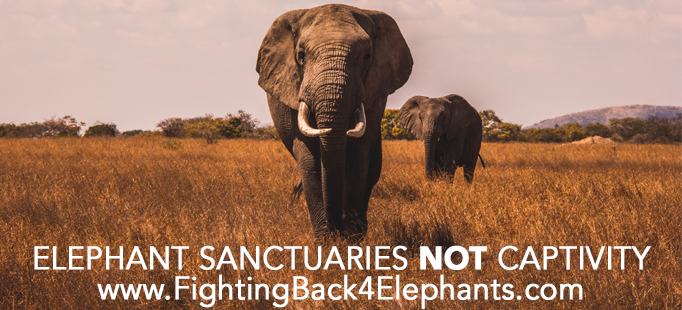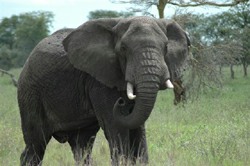Do Animals Have Shorter Life Spans In Zoos

Wild vs. Captive Elephants
 As one of the most intelligent mammals on the planet, elephants have immensely complex needs that no zoo, circus or other allure tin can provide. Life in captivity is torture for these sensitive creatures that require tight social bonds and have strong migratory instincts.
As one of the most intelligent mammals on the planet, elephants have immensely complex needs that no zoo, circus or other allure tin can provide. Life in captivity is torture for these sensitive creatures that require tight social bonds and have strong migratory instincts.
Elephants take several basic needs that can never be met in captivity.
Socialization
Wild: Elephants in the wild alive in big family units—sometimes with as many every bit 100 members—and have constant companionship. Their intricate social networks have been studied for decades. Studies show elephants mourn the loss of a family member for several days. Elephants accept even been reported to "weep" upon the death of a family member or friend.
Captive: Forced to alive in artificial social units of 2 or 3 —or in some cases kept alone —elephants in captivity are deprived of the basic necessity of family unit and socialization. Any type of bond the animals might create is ofttimes cleaved, as zoos and circuses routinely shuffle elephants between facilities.
Practise
Wild: Wild elephants typically walk upwardly to xl miles a 24-hour interval. Abiding exercise is crucial to the health of these animals, as their massive body weight puts enormous pressure on their joints and basic.
Captive: The furnishings of inadequate practise on elephants are oftentimes deadly. Elephants are frequently chained and forced to live on difficult surfaces, such as concrete. The minor sizes of their enclosures and living out of train cars exacerbate this problem fifty-fifty farther, causing arthritis, foot abscesses, and other chronic foot and articulation bug.
Life Bridge
Wild: Wild elephants have long life spans and typically live lx to 70 years of age.
Captive: Captive elephants have significantly lower life spans than their wild counterparts and are usually dead before the age of 40. Convict elephants suffer from chronic health problems, such as tuberculosis, arthritis, and foot abscesses, which nearly always lead to premature death. Furthermore, attempts to breed in captivity have been largely unsuccessful. Just three of 11 African elephant calves born in zoos since 1998 were still alive equally of June 2003. Of five Asian elephants born in the 12 months preceding June 2003, three are already dead.
Freedom From Abuse
Wild: Bated from humans, elephants have no natural enemies. When left solitary, elephants are very peaceful creatures.
Captive: Elephants in captivity are routinely beaten, shocked, driveling, and chained for long periods of time. Despite claims by circuses and zoos that "tricks" performed past elephants are based on natural beliefs, elephants in the wild do not stand on their heads, remainder or sit on stools, or walk only on their hind legs. These behaviors are demeaning, unnatural, painful, and cause fear in elephants. In club to brand such an enormous animal behave in such an abnormal mode, they must literally be beaten into submission.
![]() Learn more than about: What Y'all Tin can Do
Learn more than about: What Y'all Tin can Do
Source: https://www.lcanimal.org/index.php/campaigns/elephants/wild-vs-captive
Posted by: balfourwatiod.blogspot.com

0 Response to "Do Animals Have Shorter Life Spans In Zoos"
Post a Comment